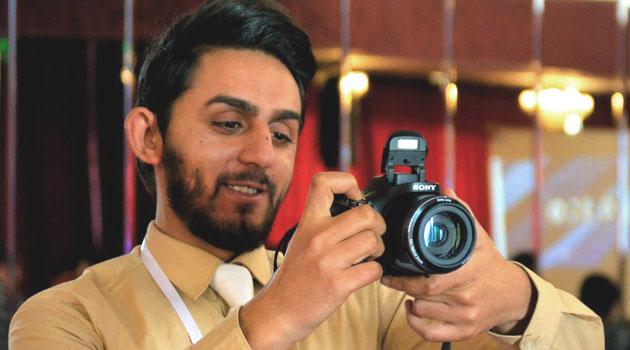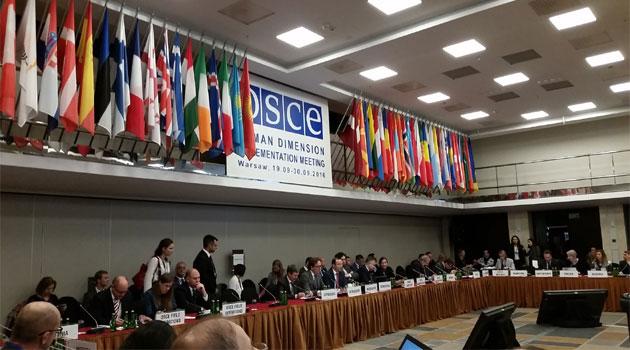Romani journalist from Macedonia raises forced marriage at the OSCE

Sunai Sabrioski is a Romani journalist from Macedonia who recently the attended the Human Dimension Implementation Meeting of the Office of Democratic Institutions and Human Rights of the Organization for Security and Cooperation in Europe in Warsaw, where civil society members usually get three minutes (or less) during the plenary sessions to make recommendations to the delegations of the 57 Participating states. News server Romea.cz conducted the following interview with him.
Q: Please tell us how you were invited to the HDIM and what you spoke about there.
A: Ramadan Berat, from the OSCE Mission to Skopje, is the person from whom I got the offer to attend this enormous diplomatic conference. He is the person who connected me with other persons in charge of this event, the Human Dimension Implementation Meeting. During my attendance at this event, I had the opportunity, in the section for intervention, to open an issue that is related to children’s rights. Early and forced child marriage was the social topic on which I chose to speak because I had researched it for more than three months in Macedonia. Of course, the time was limited and it was quite hard to paste together a whole thing tied to that subject – but still, it was enough time to mention the important issues and recommendations. Early and forced marriages raise the question of whether these children can complete their primary and secondary education, which is regulated by law. Regular education ends when children are approximately 18 years old. However, practice shows that a number of these marriages has occurred and been approved by the competent institutions without anybody having to care about the further education of these children. Those who are most affected by the methods used by the parents and relevant institutions who approve these marriages are girls who, instead of achieving an education and a normal life for their age, have to grant consent to continuing to live in poverty and in dysfunctional marriages. The first and foremost factor that could affect the reduction of underage marriages is education and sex education. Among other things, sex education has an influence on the prevention of early sexual connection and consequently on preventing teen pregnancies and premature births. Especially among the Roma community, increasing the number of children enrolled in education would further contribute to reducing the conclusion of these early and forced marriages. The Centers for Social Affairs, the Macedonian Ministry of Internal Affairs, the Public Prosecution Offices, the Basic Courts and the Ministry of Education and Science should take this issue seriously, and a serious approach would start with exploring the field and offering appropriate solutions. From the one side they should start by educating parents and children in the poorer layers of the population about these issues, and from the other side the Interior Ministry, together with the Public Prosecution Offices, should start an organized action to detect and punish the existence of these marriages where at least one spouse has not yet turned 16 years old. They should punish the parents who permit this. To effectively solve this problem, especially in Macedonia, it’s necessary to have a general strategy to develop competent persons from different areas to work on this in order for there to be effective, efficient prevention of these occurrences and sanctioning of them when they do happen.
Q: Was this your first time at the HDIM? Was there anything about it that surprised you?
A: This is the first time I got the opportunity to attend – but I promised myself it will not be the last. This is a major European event where the possibility of making contacts is huge, and directly with the relevant persons who are potential sources for further cooperation. Of course, I am still under the impression of the event, the organization of it, and as I said, I had the opportunity to establish personal contacts with relevant, significant figures in Europe.
Q: What are your aspirations for the international Romani movement, what would you like to see it achieve?
A: When it comes to Roma and their guaranteed rights and freedoms, the question is whether the Magna Carta Libertatum of 1215 still applies? A number of European countries talk about the situation and the problems faced by Roma – but when it comes to the adoption of concrete measures, despite their statements, we are still facing a number of situations of institutional discrimination, and then there are international ones. There is no need for international movements – there is a need for seriousness and consistency of respect for human rights and freedoms, both of the Roma and of other nations, but obviously we live in a time where, instead of evolution, the attempt to seek respect for fundamental freedoms and human rights has instead revolutionized, which should not be so.
Q: What is your experience of advocating together with other Romani people in your home country?
A: My job as a journalist is to explore issues where they exist and, together with other relevant actors and experts, to offer appropriate recommendations for overcoming problems. Advocacy for Roma and all the rest in the media world is not an easy job, because sensationalism is doing its own work, and with it the media narrative against Roma. For that purpose, objective reporting when it comes to Roma is highly important – because they are most affected by hate speech and discrimination, but proving that is extremely difficult. I think that even one impact/attempt to change is enough to create further change. I have found that if I am quite professional I can do the work that is within the realm of my power and influence, building public opinion by complying with ethical standards for reporting, and advocating for the Roma that way.
